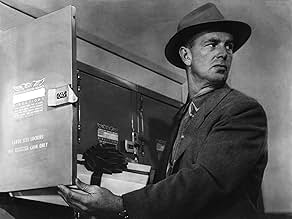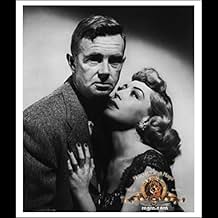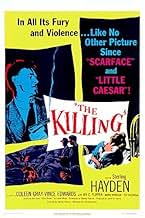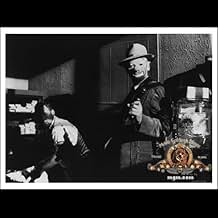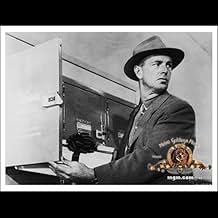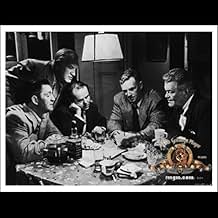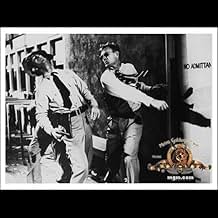Un truand monte une équipe de cinq hommes dans le but de planifier et d'exécuter un audacieux braquage pendant une course de chevaux.Un truand monte une équipe de cinq hommes dans le but de planifier et d'exécuter un audacieux braquage pendant une course de chevaux.Un truand monte une équipe de cinq hommes dans le but de planifier et d'exécuter un audacieux braquage pendant une course de chevaux.
- Director
- Writers
- Stars
- Nominé pour le prix 1 BAFTA Award
- 1 nomination au total
Ted de Corsia
- Patrolman Randy Kennan
- (as Ted DeCorsia)
Elisha Cook Jr.
- George Peatty
- (as Elisha Cook)
Joe Turkel
- Tiny
- (as Joseph Turkel)
Avis en vedette
The story of a meticulously-planned race track hold-up is a stunner in every minute you watch it, and the film's progressive use of a partly documentary style has often been acclaimed as uniquely supporting the dramatic goings-on. It definitely put a modern touch to the somewhat out-of-fashion film noir in 1956, but still greatly relied on its basic rules.
A fine new note was the neat distinction between the gang's members' motives, ranging from repaying underworld debts (De Corsia) and hope of offering a better life for his ill wife (Sawyer) to the vain ambition of pleasing his vamp wife by doing something special (Cook).
Despite the film's qualities, Kubrick's treatment of the women's rôles seems more than old-fashioned today. Women here are either the homely and sweet type (Coleen Gray) or the Bette-Davis-eyed and cherchez-la-femme type (Marie Windsor). Both are accordingly taller or smaller than their respective partners by a head.
I should like to mention one of my favourite pans: that's when the bald philosopher-catcher walks up to Joe Sawyer's bar. Lucien Ballard's camera follows him all across the crowded tote hall, a take which must have been very difficult to organize and shoot. Later, the scene is repeated with Sterling Hayden.
This motion picture is also a monument for the great histrionic art of Elisha Cook, Jr., in a stand-out performance as the born loser. (German dubbing gives him the apt voice of Stan Laurel's speaker Walter Bluhm.) This little man never just did his job in unnumerable supporting rôles but has rendered effective homage to the tragic figure on the silver screen more than any other (non-comical) character actor I can think of. Regardless of his versatility in lots of different films, his impersonations of a likeable man who is doomed to fail make him unforgettable: take his lethal parts in "Phantom Lady" (1944), "Shane" (1953) or the likes, the audience's sympathy was always with this fine actor.
A fine new note was the neat distinction between the gang's members' motives, ranging from repaying underworld debts (De Corsia) and hope of offering a better life for his ill wife (Sawyer) to the vain ambition of pleasing his vamp wife by doing something special (Cook).
Despite the film's qualities, Kubrick's treatment of the women's rôles seems more than old-fashioned today. Women here are either the homely and sweet type (Coleen Gray) or the Bette-Davis-eyed and cherchez-la-femme type (Marie Windsor). Both are accordingly taller or smaller than their respective partners by a head.
I should like to mention one of my favourite pans: that's when the bald philosopher-catcher walks up to Joe Sawyer's bar. Lucien Ballard's camera follows him all across the crowded tote hall, a take which must have been very difficult to organize and shoot. Later, the scene is repeated with Sterling Hayden.
This motion picture is also a monument for the great histrionic art of Elisha Cook, Jr., in a stand-out performance as the born loser. (German dubbing gives him the apt voice of Stan Laurel's speaker Walter Bluhm.) This little man never just did his job in unnumerable supporting rôles but has rendered effective homage to the tragic figure on the silver screen more than any other (non-comical) character actor I can think of. Regardless of his versatility in lots of different films, his impersonations of a likeable man who is doomed to fail make him unforgettable: take his lethal parts in "Phantom Lady" (1944), "Shane" (1953) or the likes, the audience's sympathy was always with this fine actor.
The Killing is a film whose legacy can still be seen in many films today. This film is not only Stanley Kubrick's first acclaimed film, but it is also credited with inventing the concept of non-linear story telling for the film industry. Some recent films that have used this technique are Reservior Dogs, Pulp Fiction, Go, Wonderland and The Usual Suspects.
The story deals with a motley crew of assorted criminals, inside men, and average joes just looking to get their hands on a large sum of money by stealing it from a racetrack. Sterling Hayden plays Johnny Clay, a hardened criminal who just finished serving a five-year prison sentence. He is the ringleader of the bunch who is determined to only go for the big heists from now on. He figures they can put you away for stealing ten dollars as easily as ten million, so what have you got to lose? The rest of the crew are mostly average people with average problems, as Clay explains early on. Some of them work at the track. One is a crooked cop. Two are hardened criminals added at the last minute to cause diversions. Everything has been timed and planned out to the letter. Of course in a film like this, things never go as planned. It wouldn't be entertaining if they did.
The killing was made on a budget of well below half a million dollars, and it shows. The film looks cheap at times, but the story is more than enough to make you forgive its financial shortcomings. The acting is nothing too special. Hayden is strong and resourceful as Johnny Clay, but he's pretty wooden. Elisha Cook Jr. is pretty good as a hen-pecked husband who is taking part in the scheme to impress his high-maintenance wife. If this film were re-cast today, you'd have to think of William H. Macy to play this character. Timothy Carey is always memorable, even with such a small part like the one he has here. Such a strange-looking guy! He gets the most interesting assignment of all the people in on the heist.
You can really tell this was made fifty years ago. Even though there are hardened criminals and low-lifes in nearly every scene, nobody ever says the F-word! There is, however, a fairly gory shootout in one scene which you normally didn't find in films back then. The killing was ahead of its time in more ways than one, I guess. Please be sure to check this one out! 8 of 10 stars.
The Hound.
The story deals with a motley crew of assorted criminals, inside men, and average joes just looking to get their hands on a large sum of money by stealing it from a racetrack. Sterling Hayden plays Johnny Clay, a hardened criminal who just finished serving a five-year prison sentence. He is the ringleader of the bunch who is determined to only go for the big heists from now on. He figures they can put you away for stealing ten dollars as easily as ten million, so what have you got to lose? The rest of the crew are mostly average people with average problems, as Clay explains early on. Some of them work at the track. One is a crooked cop. Two are hardened criminals added at the last minute to cause diversions. Everything has been timed and planned out to the letter. Of course in a film like this, things never go as planned. It wouldn't be entertaining if they did.
The killing was made on a budget of well below half a million dollars, and it shows. The film looks cheap at times, but the story is more than enough to make you forgive its financial shortcomings. The acting is nothing too special. Hayden is strong and resourceful as Johnny Clay, but he's pretty wooden. Elisha Cook Jr. is pretty good as a hen-pecked husband who is taking part in the scheme to impress his high-maintenance wife. If this film were re-cast today, you'd have to think of William H. Macy to play this character. Timothy Carey is always memorable, even with such a small part like the one he has here. Such a strange-looking guy! He gets the most interesting assignment of all the people in on the heist.
You can really tell this was made fifty years ago. Even though there are hardened criminals and low-lifes in nearly every scene, nobody ever says the F-word! There is, however, a fairly gory shootout in one scene which you normally didn't find in films back then. The killing was ahead of its time in more ways than one, I guess. Please be sure to check this one out! 8 of 10 stars.
The Hound.
The non-linear storytelling, overused nowadays even when it does not make any sense, is key to this taught thriller, narrated almost as a documentary.
Besides, despite the non-linear structure, the plot is very easy to follow, thanks to the narrator who tells the audience everything from the time of the day to the details about the gang involved in the audacious heist at the races.
It does't hurt that main character Johnny Clay is played by one of my favourite actors, Sterling Hayden, in a role that reminds me of his doomed character in The Asphalt Jungle. Clay is a coincise, world-wary character who planned the heist to the last detail, unfortunately missing the "human factor".
As it's customary in stories about failed heists, there's always one detail that is either unknown or unpredictable, but important enough to wreak havoc even in the most perfect plan.
Perhaps my favourite Kubrick's movie, with a tight script, excellent cast and no-nonsense approach.
Besides, despite the non-linear structure, the plot is very easy to follow, thanks to the narrator who tells the audience everything from the time of the day to the details about the gang involved in the audacious heist at the races.
It does't hurt that main character Johnny Clay is played by one of my favourite actors, Sterling Hayden, in a role that reminds me of his doomed character in The Asphalt Jungle. Clay is a coincise, world-wary character who planned the heist to the last detail, unfortunately missing the "human factor".
As it's customary in stories about failed heists, there's always one detail that is either unknown or unpredictable, but important enough to wreak havoc even in the most perfect plan.
Perhaps my favourite Kubrick's movie, with a tight script, excellent cast and no-nonsense approach.
Film noir in all its splendor, with a very dynamic rhythm, far from '2001, a space odyssey': an audacious burglary seems perfectly orchestrated and prepared with a surgical precision, until a minor glitch transforms a 'Symphonie fantastique' in a 'Descente d'Orphée aux enfers'.
There's little to fault in Stanley Kubrick's classic robbery tale. The acting is first-rate with Marie Windsor, as Mrs. Peaty, a sarcastic stand-out. The story just pops off the screen - and at less than 90 minutes, there's literally no filler. I love the winding time line ("earlier that day" etc.), which has been liberally utilized by Quentin Tarantino (Jackie Brown, Pulp Fiction, Reservoir Dogs). This film was made right before Kubrick's WWI marvel, Paths of Glory, and his genius is apparent in both. No wasted words or actions. Love that last line!
Le saviez-vous
- AnecdotesInitial test screenings were poor, citing the non-linear structure as the main problem. Stanley Kubrick was forced to go back and edit the film in a linear fashion, making the film even more confusing. In the end, it was released in its original form, and is often cited as being a huge influence on other non-linear films like Les enragés (1992) and Fiction pulpeuse (1994).
- GaffesDuring the robbery, it's clear that a significant amount of the money is in neatly banded bundles of crisp brand-new bills, yet when it's transferred from the duffel bag to the suitcase, all the bills are loose, unstacked, and appear well-used.
- Citations
Johnny Clay: You'd be killing a horse - that's not first degree murder, in fact it's not murder at all, in fact I don't know what it is.
- ConnexionsEdited into Hai-Kubrick (1999)
Meilleurs choix
Connectez-vous pour évaluer et surveiller les recommandations personnalisées
Détails
- Date de sortie
- Pays d’origine
- Langue
- Aussi connu sous le nom de
- Casta de malditos
- Lieux de tournage
- société de production
- Consultez plus de crédits d'entreprise sur IMDbPro
Box-office
- Budget
- 320 000 $ US (estimation)
- Brut – à l'échelle mondiale
- 380 $ US
- Durée
- 1h 24m(84 min)
- Couleur
Contribuer à cette page
Suggérer une modification ou ajouter du contenu manquant


